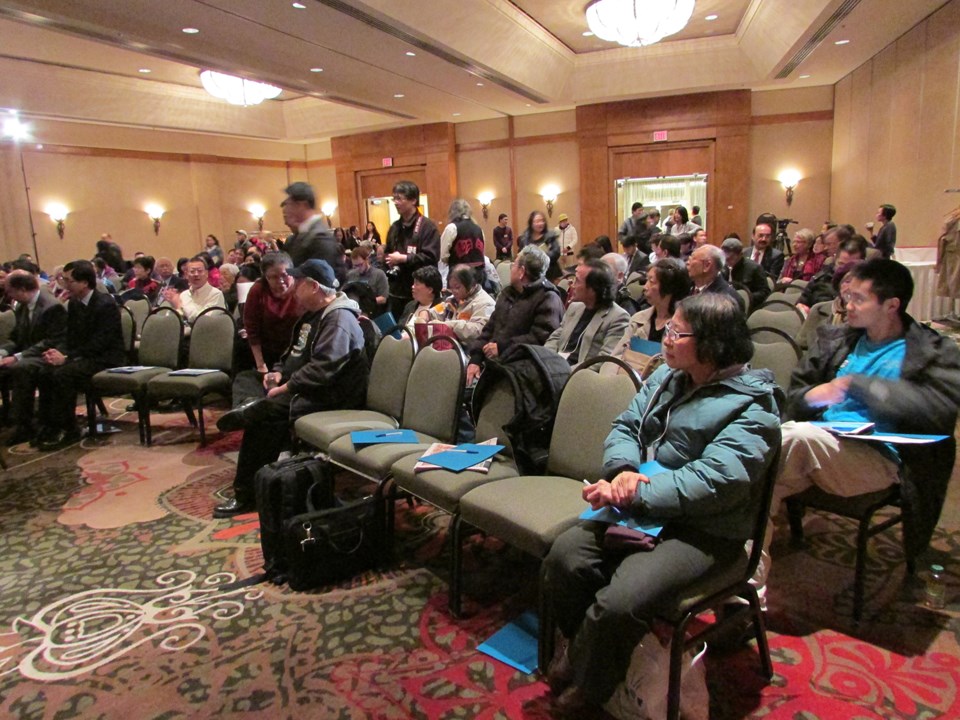A sincere apology to compensate for past legislated discrimination against the Chinese community in B.C. should include education, reconciliation and a head tax refund, according to residents at a Burnaby forum Monday night.
More than 140 people attended the "apology for historical wrongs consultation forum" at the Hilton Vancouver Metrotown on Jan. 20, to both speak on and listen to suggestions on how a formal apology to Chinese Canadians should be delivered, worded and what legacy efforts should come as a result.
Teresa Wat, minister responsible for Asia Pacific strategy and multiculturalism, hosted the fifth of seven such forums to address historical wrongdoings committed by former B.C. governments.
"Today, Burnaby is one of British Columbia's most diverse communities and home to more than 60,000 ethnic Chinese," Wat said. "I'm here today to engage with you in a meaningful consultation. I would like to hear your thoughts on the appropriate wording, delivery and legacy efforts of a formal apology."
The B.C. legislature passed more than 100 pieces of discriminatory legislation and regulation against the Chinese community in the 1800s and 1900s - up until 1947.
Wat said input received through the forums will guide the delivery of a formal apology, because "we want to get this apology right."
More than 30 people addressed the minister and the crowd, including Angela Brown, who grew up in Burnaby and East Vancouver.
"Although my family immigrated here in 1970 we weren't descendants of head tax payers, but we suffered from individual, cultural and systemic racism stemming from past racist legislation," said Brown, who is also the Vancouver School Board's anti-racism and diversity mentor. "I believe the apology should include wording that has specific action, that is meaningful, relevant and educational."
Brown noted that while her family experienced racism in both cities, it was harsher in Burnaby.
Sandra Wilking, a Burnaby resident for the past 46 years, said she was able to speak at the event thanks to the hard work done by a generation of individuals who suffered.
"They suffered the injustices and they worked through it," she noted.
Wilking said an apology should recognize the sacrifices and contributions of Chinese Canadians to B.C. and Canada, particularly made by Chinese veterans.
"We need to clearly state that the past history should not be repeated again," she said. "Regardless of who we are as a culture, race and country of origin."
Wilking said a legacy community fund or endowment should be established and run by a non-partisan board with the purpose of creating community initiatives to educate and inform people of all ages.
"Finally, communicating the outcomes of these consultations and specific actions taken should be communicated widely and strongly throughout British Columbia to all British Columbians," she said. "I'd like to stress this is a shared history for all of us, whether it's Chinese or non-Chinese."
However, Karen Lee, of the Head Tax Families Society of Canada, said any legacy efforts should be decided by head tax families.
"We're the ones who know the suffering," she said. "We're the ones that can explain. ... There is healing and reconciliation, and that healing and reconciliation should be guided by the head tax families of Canada."
Lee said her great grandfather came to B.C. in 1870 and had many rights taken away from him.
"He wasn't able to vote (because) in 1872, the vote was taken away from him," she noted. "We, as a Chinese community, at that time had no representation."
The privileges the Chinese community enjoys now were fought for by previous generations, Lee added.
"My great grandfather also had the difficulty of bringing his family over, so he wanted to lay his roots here and so he did, but the legislation and the insidious racism ... until 1947 prevented that from happening."
Another member of the head tax family society said the $9 million collected by previous B.C. governments should be symbolically refunded to those it was taken from.
As the Burnaby NOW previously reported, Wat said the apology would not include compensation to head tax families because the federal government addressed that issue in 2006.
The next two forums will be held in Prince George and Richmond. For more information, visit www.embracebc.ca.
Some notable historical legislation enacted against Chinese people in B.C.:
-1855: The Colony of Vancouver Island passed the first act to exclude Chinese immigrants and it required payments of $10 for each male native of China, or any person born from Chinese parents.
-1872: An amendment to the qualification and registration of the Voter's Act was passed, excluding all Chinese people from provincial franchise.
-1884: The Lieutenant Governor gave assent to an act that prevented Chinese people from acquiring Crown lands.
-1885: B.C. Lieutenant Governor gave assent to an act that would prevent Chinese immigration.
-1891: The B.C. legislature asked the federal government to raise the head tax to $200. (The federal government raised the head tax to $500 in 1903).
-1896: Japanese and Chinese people were disfranchised from municipal elections in B.C.
-1912: B.C. Premier Richard McBride addresses the legislature about oriental immigration. The address was called, "Exclusion of Asiatics."
-1919: B.C. passes bill banning Chinese people from employing or having managerial rights over women in factories, restaurants or laundries.
-1967: The federal immigration policy was overhauled, and the race and ethnic origin was removed as a valid consideration for immigrant admissibility in Canada.



